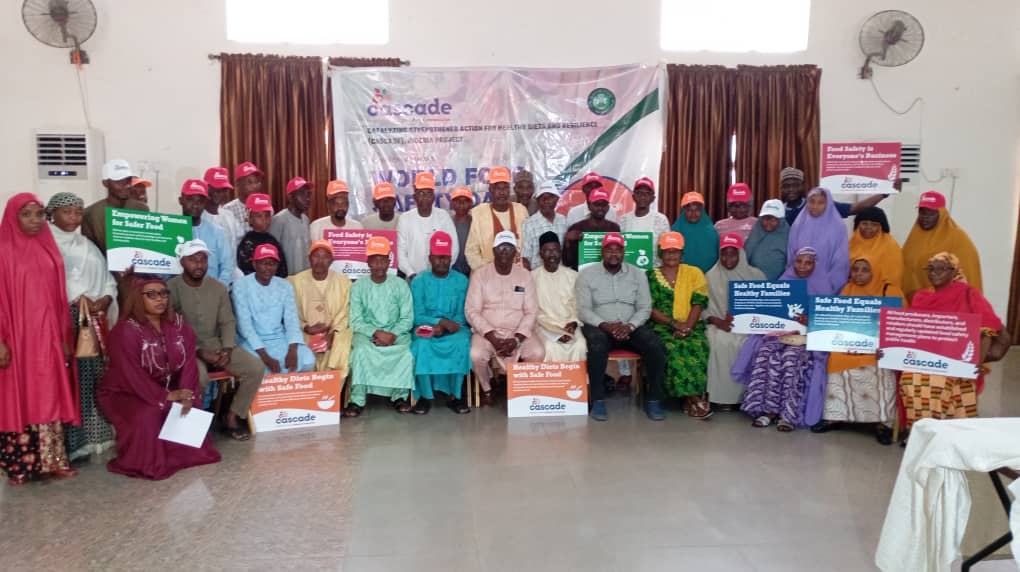CurrentReport Blog In a concerted effort to combat the growing misuse of agrochemicals in food preservation, the National Agency for Food and Drug Administration and Control (NAFDAC) and the non-governmental organization Cascade have issued a stark warning to farmers, food manufacturers, and the general public.
The recent statements came during the World Food Safety Day event, highlighting the critical need for safe food handling and proper agrochemical use.
Dire Global Consequences of Agrochemical Abuse
NAFDAC’s Director General, Moji Adeyeye, emphasized the severe repercussions of agrochemical misuse. She pointed out that food poisoning, often a result of such practices, leads to the deaths of over 4 million people globally each year. This alarming statistic underscores the urgency of addressing this issue. “The illegal and unsafe use of agrochemicals in food preservation not only endangers individual health but also undermines public trust in our food systems,” Adeyeye stated.
NAFDAC’s Firm Stance on Banned Chemicals
Reaffirming NAFDAC’s dedication to safeguarding public health, Adeyeye highlighted the agency’s ongoing efforts, such as the ban on 100ml dichlorvos (commonly known as snipper). This chemical, previously used for food preservation, has been prohibited due to its detrimental effects on human health. “Our commitment to ensuring the safety of food and drugs remains unwavering. We will continue to enforce regulations and raise awareness to protect consumers,” she added.
Thematic Focus on Unexpected Challenges
This year’s theme for World Food Safety Day, “Prepare for the Unexpected,” resonates deeply with global issues like hunger, malnutrition, and food safety. Adeyeye emphasized that these challenges require collective action and vigilance to ensure food security and public health.
Local Efforts in Bauchi State
Dr. Paul Kamai, the Bauchi State Coordinator for NAFDAC, echoed the urgency of tackling food safety issues. He stressed that food safety is a public health priority and integral to economic development. Kamai identified key contaminants, including agrochemical residues and microbial pollutants, and detailed NAFDAC’s proactive measures to eliminate these hazards.
Kamai said, “Effective food safety management is not just about protecting health; it’s about fostering economic growth and stability.” His comments reflect NAFDAC’s broader strategy to enhance food safety protocols and regulatory frameworks across Nigeria.
Addressing Malnutrition Through Local Initiatives
Adding to the discourse, Jibrin Mohammed Yusuf, Permanent Secretary of the Ministry of Budget and Multilateral Coordination and Chairman of the Committee on Food and Nutrition, voiced concerns over rising malnutrition rates among children under five in Bauchi State. He advocated for comprehensive approaches to address both food safety and availability, citing initiatives like school gardens that support local and nutritious diets.
Cascade’s Role in Food Safety Education
Cascade’s Private Sector Support Officer, Olusesi Oliyide, highlighted the organization’s efforts to educate food vendors, especially those involved in the Homegrown School Feeding Programme. These training sessions focus on proper food storage, preparation, and packaging to prevent contamination. “Ensuring food safety is crucial for maximizing the nutritional value of meals provided to our children,” Oliyide remarked.
Combating Malnutrition with Nutrient Supplements
Asimobi Chidiebere from Alive & Thrive FHI 360 Bauchi shed light on their contributions to combating malnutrition. The organization distributes micronutrient powders to children under five, helping to address nutritional deficiencies and promote healthier growth and development.












